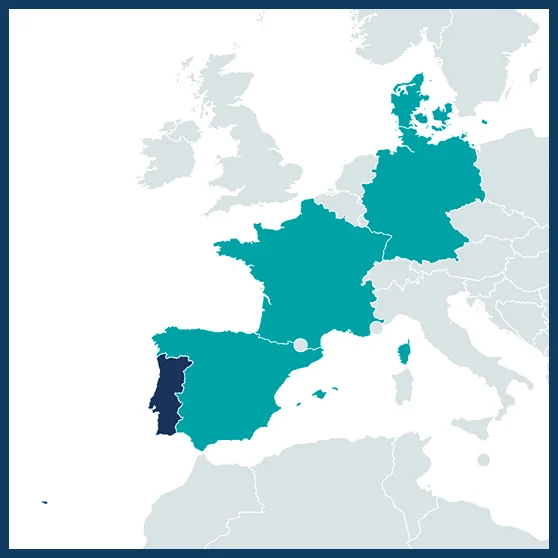01.04.2022 – 01.04.2025
€ 1,008,85
Teresa Paula Fernandes Amaro
amaro@ua.pt
Coordinator: Biology, University of Aveiro, Aveiro, Portugal
Inc. Underwater Experience, Le Rove, France
Marine Environment Sciences (LEMAR), University of Western Brittany/CNRS/IRD/Ifremer, Plouzane, France
Marine Ecology & Marine Evolutionary Ecology, GEOMAR Helmholtz Centre for Ocean Research, Kiel, Germany
Aquatic biodiversity & Conservation, Interdisciplinary Centre of Marine and Environmental Research, Matosinhos, Portugal
Association of the defense of the Patrominy of Mértola, Mértola, Portugal
Oceanography and Fisheries, University of the Azores, Horta, Faial, Portugal – Azores
Association for the development of the Atlantic International Research Centre, Angra do Heroismo, Portugal – Azores
Evolutionary Biology & Ecology and Environmental Sciences, University of Barcelona, Barcelona, Spain
Marine Sciences Institute, Spanish National Research Council, Barcelona, Spain

The Republic of Cabo Verde is an African archipelago, which depends largely on marine resources. Their coastal areas ensure human wellbeing through resources availability (e.g. food) and jobs. However, coastal regions in Cabo Verde are highly exposed to natural hazards and to multiple pressures associated with anthropogenic activities, including reclamation of wetlands for agriculture, water contamination and plastic pollution. They are, thus, in an enormous need for sustainable development of activity sectors linked to the sea, i.e. Blue Growth. Cabo Verde is a country where Blue Growth can help to contribute with solutions for current issues, such as high poverty rates, while building on the long tradition of local economical use of the marine environment. However, no valuable baseline knowledge on the environmental status of their marine ecosystems is available, hampering the development of measures ensuring their sustainable use, management, conservation and restoration. Information on marine habitats for this archipelago is scarce, and there is no integrated evaluation of marine resources to support knowledge-based regulations and guidelines for their sustainable use, in line with the national development trends. Santo Antão has the highest poverty rate of the Archipelago, and income inequalities, and is highly vulnerable to extreme natural phenomena (e.g. droughts, tropical cyclones).
COAST will evaluate the vulnerability of the studied marine communities and create pilot conservation and restoration actions for selected degraded ecosystems, to increase their resilience. The project will provide multidisciplinary understanding about the biodiversity and ecosystem functioning, as well as suitable indicators of recovery, which is the crucial basis to establish sound conservation or restoration measures. These are the pillars upon which conservation and restoration are to be built, allowing for implementation of integrated environmental management actions based on the best scientific knowledge.
The COAST project will significantly contribute to understanding the status and functioning of the ocean system around Santo Antão island in Cabo Verde, as its contribution to the country’s economy. The project aims to achieve 5 main objectives:
- To characterise and map pelagic and benthic habitats, as well as anthropogenic pressures of Santo Antão.
- To estimate patterns of diversity in marine communities in relation to habitat features.
- To assess the vulnerability of the studied communities to both environmental and anthropogenic pressures, through the application of risk assessment models.
- To implement conservation and restoration actions for selected habitats/ecosystems based on the results of the first three objectives.
- To provide baseline data that inform policymakers, authorities, institutions and practitioners towards effective marine conservation and restoration in these habitats and demonstrate the repeatability of the proposed approach in other regions.
COAST expects to improve current knowledge on marine habitats of Santo Antão island and to provide efficient management recommendations for their sustainable development, along with mitigation plans for the effects of global changes, in line with the needs of stakeholders and local communities. By involving key stakeholders, such as local environmental authorities (i.e. Port Maritime Agency, Porto Novo City hall) and public agencies (ADPM, Biosfera), local members from the community who directly or indirectly depend on and benefit from the ocean (fishermen), COAST will have the opportunity to actively translate science into policy interventions and will also contribute to reducing economic and social disparities, linking the needs of the marine ecosystems to the community.
Participation in the COAST project of local NGOs, universities, fishermen and especially policymakers (local fishermen associations, local NGOs like
BIOSFERA, Porto Novo city hall, local environmental agencies) from the start and the approaches and actions is ensured. COAST aims at and emphasises on the importance of the creation of guidelines with priority conservation strategies to achieve efficient management recommendations, not only locally, but also in other islands and coastal African countries. The City Hall mayor of the main village (Porto Novo) of the island has already shown his support for this project, as well as the Maritime and Port Institute, ENAPOR, local fishermen associations and Biosfera.
COAST will focus on assessing different biodiversity dimensions in relation to the functioning of Santo Antão marine ecosystems. Aside from coastal habitats and anthropogenic pressures mapping, COAST will also evaluate the vulnerability of the studied marine communities and create pilot conservation and restoration actions for selected degraded ecosystems, to increase their resilience. The project will also estimate potential synergies and conflicts between conservation objectives and social and economic objectives to develop and test new decision-making tools and processes for the effective development of integrated marine management plans of these areas. This will demonstrate potential societal and policy impacts. Overall, the project will provide advice on effective marine conservation and restoration in selected degraded areas, while considering uncertainties associated with such actions.
- Fundação para a Ciência e a Tecnologia (FCT), Portugal
- Agence Nationale de la Recherche (ANR), France
- German Research Foundation (DFG), Germany
- Fundo Regional para a Ciência e Tecnologia (FRCT),
Portugal - Agencia Estatal de Investigación (AEI), Spain